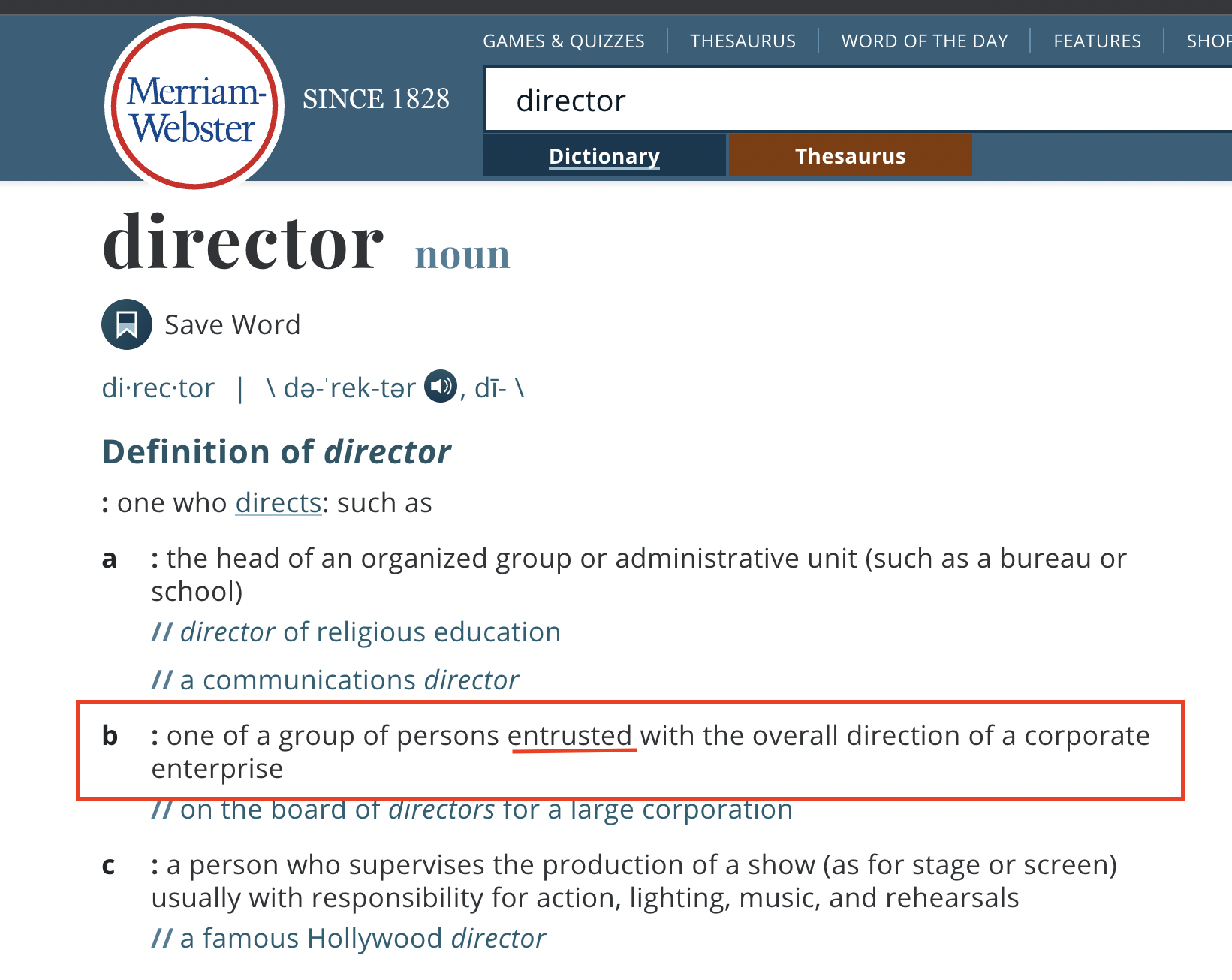What are the Director’s Duties in a corporation in legal English?


The History of Corporations

Advantages and Disadvantages of a Corporation

Directors & Duties
What are the director’s duties in a corporation?

Types of directors in Legal English
In the Companies Act a director is defined as including “any person occupying the position of director”, by whatever name called.
Executive Director
If you have been appointed as a director and you are involved in the day-to-day decision making, you are called an executive director. (C-Suit)
Understanding the C-Suit
Chief Compliance Officer (CCO)
Chief Human Resources Officer (CHO)
Chief Security Officer (CSO)
Chief Green Officer (CGO)
Chief Analytics Officer (CAO)
Chief Data Officer (CDO)
Chief Marketing Officer (CMO)
Non-Executive Director
If you have been appointed as a director, but you do not have any involvement in the day-to-day running of the company, you are called a non-executive director.
Industry Experts
Policy Makers
Philanthropists
Professors
Shadow Director
A shadow director is defined in the Companies Act as a “person in accordance with whose directions or instructions the directors of the company are accustomed to act”.

Legal English Innovation

Reading Activity
Area of law: Company/Corporate Law
Section 5 – Director’s Role
Reading task: Take notes.
Timing: This reading is 450 words.
The members of a limited company are the shareholders. However, the shareholders do not run the company. The directors do this. All private limited companies must have at least one director. A public limited company must have at least two directors.
the members
to run
a private limited company
a public limited company
Shareholders can choose who they want to appoint as a director. You will find the rules concerning directors in the company’s articles of association. The articles may say how many directors there should be, how long they can serve as a director, and what happens at the end of their term. In many companies, directors are required to retire after a specific period, for example, three years, although the directors can be reappointed. If the company is dissatisfied with the performance of a director, it can remove a director before the period of their office has expired. However, the company may still be liable to pay the removed director compensation or damages in respect of the termination of the appointment as director.
shareholders
to appoint
a director
articles of association
to serve
a term
to reappoint
performance of a director
to remove
to be liable
damages
In the Companies Act a director is defined as including ‘any person occupying the position of director, by whatever name called.’ If you have been appointed as a director and you are involved in the day-to-day decision making, you are called an executive director. If you have been appointed as a director, but you do not have any involvement in the day-to-day running of the company, you are called a non-executive director. As a non-executive director, you will have the same legal responsibilities as other directors. If you have never been appointed as a director, you may still be classed as a shadow director. A shadow director is defined in the Companies Act as a “person in accordance with whose directions or instructions the directors of the company are accustomed to act”. As a shadow director you will have the same legal responsibilities as other directors.
the Companies Act
to occupy the position
the day-to-day
an executive director
a non-executive director
legal responsibilities
a shadow director
As a director, you have many business responsibilities for ensuring the success of your company, in areas such as health and safety, employment law and tax. In all your actions you are expected to exercise a degree of skill and care. The term ‘fiduciary duty’ is used a lot when talking about directors. This means that you, as a director, are in a position of trust and you must act in good faith and in the interests of the company as a whole.
business responsibilities
to ensure
health and safety
to exercise
a degree of skill and care
fiduciary duty
a position of trust
to act
in good faith
in the interests
If a director acts improperly, this may lead to a fine, disqualification from being a director, personal liability for the company’s debts, or a criminal conviction.
to act improperly
to lead to
a fine
a disqualification
personal liability
the company’s debts
a criminal conviction
How was your comprehension? Did you understand 65, 75, 85, or 95%?
Reading and focusing on each and every vocabulary word, technical term, and detail is a strategy to help you improve your overall legal English.

Pop-Quiz
Can you find similar terms for these words?
To formally choose someone for a particular job or position. The term is __________ .
To have become used to something. The term is __________ .
To dismiss a Director from his or her position. The term is __________ .
Dishonestly or illegally. The term is __________ .
To be in the position of a Director and to perform the duties required by that position. The term is __________ .
To use, to put something into effect. The term is __________ .
Regarded as belonging to a particular group. The term is __________ .
The state of being stopped from being in a particular job, or from taking part in a particular activity. The term is __________ .

Legal English Innovation
Group Discussion Questions
Discuss the following questions with your classmates in an open debate. Remember to join the conversation by stating “this is your name“. This will keep the conversation organized and polite, and if you have any questions or comments please do not hesitate to ask.
1. In your opinion, what do you think is the main function of a director?
2. What are the secondary responsibilities and functions of a director?
3. How important is Corporate Social Responsibility?
4. What is the most difficult part about directing a company?


Legal English Innovation

Listening Activity
Area of law: Company/Corporate Law
Section 9 – Director’s Duties
Listening task: Take notes and organize a presentation setting out the 7 director’s duties.
Timing: This listening is 5 minutes and 30 seconds long.
Good morning, ladies and gentlemen. Thank you for coming to this seminar. This morning’s topic is the role of company directors following the recent introduction of new legislation. This affects all companies in the United Kingdom. The role and duty of directors has developed over the years from case law and statute. You are all aware of the fiduciary duty of the director to the company. Directors have this fiduciary duty because they are in a position of trust and confidence in relation to the company. Directors have a general obligation to act in good faith and in the best interests of the company and not for any improper purpose. They mustn’t, for example, make a secret profit out of their position.
A director’s duties were not clearly stated in statute until 2006. However, following the Companies Act 2006, there is a now a statutory statement of directors’ duties. This was done so that the law is made clear for directors. The codified duties are contained in sections 170 to 177 of the Act. Section 170 makes it clear that the duties of a director are owed to the company and therefore generally only the company can enforce them. The Act then lists seven specific duties. The first duty is the duty of a director to act within the company’s constitution and only exercise powers for the purpose for which they are intended.
The second duty found in section 172 is the duty to promote the success of the company for the benefit of its members as a whole. This new duty broadly replaces the common law fiduciary duty to act in the “best interests of the company” that I mentioned earlier. In fulfilling the duty to promote the success of the company, the Act says that the directors must have regard to a long list of specific factors. These include the likely long-term consequence of any decision, the interests of the company’s employees, the company’s business relationships with suppliers, customers and others, the impact of the company’s operations on their community and the environment and so on. There was considerable criticism of this new duty, with people expressing fears that directors will be more defensive in their actions. This is because directors must consider this long list of factors with every action they take. Time will tell whether this happens or not.
The third duty is to exercise independent judgment, while section 174 deals with the fourth duty, which is to exercise reasonable care, skill and diligence. An important factor to consider in this area is the individual director’s level of specialist knowledge. The common law principles are now clear. Directors who have specialist knowledge must exercise greater care and skill than those who do not have this particular knowledge. Similarly, different skills will be expected of, say a finance director and a personnel director.
Section 175 provides for the fifth duty, which is to avoid conflicts of interest. A director must avoid a situation in which he or she has, or can have, a direct or indirect interest that conflicts, or possibly may conflict with, the interest of the company. This duty is not infringed however, if the matter has been authorised by independent directors, so long as the director in question does not form part of the quorum making the decision. For those of you from companies having two directors with a quorum requirement of two – be careful!
The sixth duty is not to accept benefits, including bribes, from third parties, while the final duty is the duty in section 177 for a director to declare his or her interest in a proposed transaction before the transaction is entered into. If a director breaches this duty, he or she commits an offence, which may result in a fine. I’ve prepared a fact sheet for you, summarising your duties as a director under the new legislation, which you can take before you go. Now, are there any questions about what I’ve mentioned before we move on the next point?

Legal English Innovation

Analytical Activity – Fact Sheet
Area of law: Company/Corporate Law
Section 170 – Director’s Duties
Reading task: Take notes and organize a presentation setting out the 7 director’s duties.
To act within the directors’ powers (Section 171);
To promote the success of the company and to act in good faith (Section 172);
To exercise independent judgement (Section 173);
To exercise reasonable care, skill and diligence (Section 174);
To avoid conflicts of interest (Section 175);
Not to accept benefits from third parties (Section 176); and
To declare interest in proposed transactions or arrangements (Section 177).
- Section 171: A director must act in accordance with the company’s constitution as defined in Section 257 that is the company’s Articles and any resolutions and agreements. The company, through its Articles, may go further than the statutory duties and may place more requirements on its directors.
- Section 172: A director must act in a way he or she considers, in good faith, would be most likely to promote the success of the company for the benefit of its members /shareholders. For “not for profit” companies such as charitable companies which are not intended to benefit members, the duty is to promote the success of the company by achieving the relevant purposes of the company.
To do this, the directors must consider the following factors:
the likely consequence of any decision long term;
the interest of the company’s employees;
the need to foster the company’s business relationship with suppliers, customers and others;
the impact of the company’s operations on the community and environment;
the desirability of the company maintaining a reputation of high standards of business and conduct; and the need to act fairly as between members of the company.
The above list is not exhaustive but, rather, identifies those matters that, at the least, directors are expected to take into account. The more significant a decision, the more important it will be to ensure that there is a paper trail showing that the board actively considered how a particular decision was arrived at and how it will affect the company’s employees, customers, suppliers, the environment and its commercial reputation and any other relevant factors.
- Section 173: Directors should not, in exercising their duties, be influenced by others. Also, they should not fetter their discretion. However, these duties should not prevent directors from:
acting in accordance with the company’s constitution;
relying upon advice in areas where this is required (provided that they exercise their own judgement in deciding whether to follow such advice);
delegating to appropriate individuals or committees where permitted;
or complying with contracts by which the company is bound.
- Section 174: As previously set out in case law, directors have a duty to exercise reasonable care, skill and diligence. A director owes a duty to his company to exercise the same care, skill and diligence that that would be exercised by a reasonably diligent person with regard to:
the general knowledge, skill and experience that may reasonably be expected of a person carrying out the same functions as the director in relation to the company (an objective test); and the general knowledge, skill and experience that the director actually has (a subjective test).
It will not be open to a director to claim that his lack of skill and experience prevents him from performing to at least the standards expected of a reasonably diligent person. If, on the other hand, he has a high level of skill and experience, he will be expected to perform to that standard.
It will not be open to a director to claim that his lack of skill and experience prevents him from performing to at least the standards expected of a reasonably diligent person. If, on the other hand, he has a high level of skill and experience, he will be expected to perform to that standard.
Duties on conflicts of interest (Sections 175 – 177):
- Section 175: A director “must avoid a situation in which he has, or can have, a direct or indirect interest that conflicts, or possibly may conflict with the interests of the company”. This applies in particular to the exploitation of any property, information or opportunity, and it is immaterial whether the company can take advantage of the property, information or opportunity.
The duty does not apply to a conflict of interest arising in relation to a transaction or arrangement with the company. The duty is not infringed if the situation cannot be reasonably regarded as likely to give rise to a conflict of interest or the matter giving rise to the conflict has been authorised by the directors (in accordance with the procedure set out in Section 175). For a private company, the directors are entitled to authorise such conflicts unless the company’s constitution prevents this. Currently, only members can give this authorisation.
It should be noted that this duty continues to apply to a person ceasing to be a director as regards to the exploitation of any property, information or opportunity of which he became aware at a time when he was a director.
- Section 176: This section codifies the rule which prohibits directors from exploiting their position for personal benefit. There is no “de minimis” threshold or minimum monetary value placed on such a personal benefit, and indeed the benefit need not be financial. For example, accepting appointment to an honorary position could be a benefit.
7. Section 177: If a director is in any way, directly or indirectly, interested in a proposed transaction or arrangement with the company he must declare the nature and extent of the interest to the other directors at a meeting of the directors. The declaration must be updated if it proves to be inaccurate or incomplete.
There is no need to declare an interest if:
the director is unaware of the interest (but he will be treated as being aware of matters of which he ought reasonably to be aware);
the interest cannot reasonably be regarded as likely to give rise to a conflict of interest;
the other directors are already aware of it; or
the interest concerns the terms of a service contract that have been or will be considered by a board or committee meeting.

Legal English Innovation

New Vocabulary
a sole proprietorship
a partnership
a legal entity
to get sued
to go after
a debt
a shortfall
to manage
A board of directors
the day-to-day operations
double taxation
a profit
a pass-through entity
a dividend
We can teach you legal English.

Legal English Innovation

US Legislation
The Sherman Antitrust Act of 1890
Delaware enacted its General Corporation Law in 1899
Securities and Exchange Act of 1934

UK Legislation
The Bubble Act 1720’s
The Joint Stock Companies Act 1844
The Companies Act 1862
The Companies Act 2006

Legal English Innovation
Writing Activity

Area of Law: Company Law
Writing Task: set out a letter to a client advising on setting up a corporation. Point out the advantages and disadvantages to help them in their decision making. Maintain a formal register.
Word count: 400 words
The Essays of Warren Buffett: Lessons for Corporate America
The fifth edition of The Essays of Warren Buffett: Lessons for Corporate America continues a 25-year tradition of collating Warren Buffett’s philosophy in a historic collaboration between Mr. Buffett and Prof. Lawrence Cunningham. As the book Buffett autographs most, its popularity and longevity attest to the widespread appetite for this unique compilation of Mr. Buffett’s thoughts that is at once comprehensive, non-repetitive, and digestible. New and experienced readers alike will gain an invaluable informal education by perusing this classic arrangement of Mr. Buffett’s best writings.

Legal English Innovation
General Vocabulary Review
to boil down to
to have a bearing on
high-profile
to hand down
a party
the run up to
a relationship of employment
to take the plunge
a legal issue
a corporate advisory company
a claimant
to take place
evidence in court
to trigger off
due to depart
to hear
legal advice
to check out
staff
relevant statute
further declarations
to get things in writing
to hang on
to apply law
infringement
a dispute
healthy profit
a contract of sale
a straightforward case
an assignment
to draw up
jurisdiction
on the grounds of
to have copyright in
to issue a claim
a living wage
accounts
to blame
to rip off
blatantly
to have a word with someone
as long as
a sole trader
personal assets
the cost
the retail price
just around the corner
to cook the books
in terms of
to drop dramatically
to bear in mind
a stall
to move abroad
a logo
not a trace
to set up
a limited company
to bump into
in conjuction with
a binding contract
to spot
a sternly-worded letter
to sky dive
a partner
a written agreement
governing law
engaged in
a number of
a sum
to dismiss
trademark
full and final
to win a case
a small fortune
business premises
a bit shabby
new competition
to waive
to put a charge
to lead to
to show up
maternity leave
to deal with
the case
to harm
to add fuel to the fire
a fee
reasonable legal fees
to add insult to injury
a signature
complied with
amid a storm
Indeed
just bear with me
royalty
scrutiny
to settle
to sue
to invoice / an invoice
a tenant
a landlord
self-employed
substandard work
breach of contract
to turn up
to earn a living
bankrupt
a bailiff
a battle
a solicitor
a bill
conveyancing
a mortgage lender
to borrow
a formal written warning
loopholes
clamp down
accounting
to sign and date
to sack / to fire
straight away
income
to take to court
small claims court
to take out a loan
legal interest in an asset
a claim
to hold by a third party
to seize
outcome of a case
hasn’t paid a penny
sold at auction
to follow up
to carry out
to chase up
a matter
to draw up
ownership
a total sum
to squeeze in
MPs
extent of
to deflect
foreseeable future
wrongful
an installment
to draw conclusions
a deposit
specific performance
bits and pieces
a stamp duty
the facts
to complain
to award
to go ahead
interest and costs
to struggle
a Charging Order
to enforce a judgment
to draw a line under
to draw a line under something
to cover
to threaten
damages or losses
to purchase
About the Author
Eric Froiland
Eric is a legal English teacher from the United States and has been based out of Bogota, Colombia for the last 10 years. He is the owner and founder of Legal English Innovation SAS, which is recognized as the top legal English academy in Colombia and is an official Test of Legal English Skills (TOLES) examination center.





